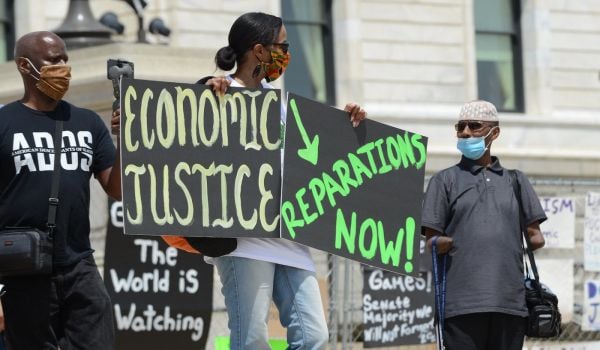America’s Red and Blue Political-Economic Divide is Not Going Away
The nation’s economic standoff between red and blue states has intensified this election cycle, according to new data, reports Brookings.
The analysis shows that Biden’s winning base in 477 counties accounts for 70 percent of the nation’s economic output, while Trump’s losing base accounts for 29 percent. This aligns with similar data released in 2016, which showed the 2,584 counties Trump won made up 36 percent of economic activity while Clinton’s 472 counties made up almost two-thirds of the aggregate economy, reports Brookings.
The updated economic-political map suggests an increasingly heightened divide between metropolitan areas that voted blue and small towns and rural areas that voted red.
“Blue and red America reflect two very different economies: one oriented to diverse, often college-educated workers in professional and digital services occupations, and the other whiter, less-educated, and more dependent on “traditional” industries,” reports Brookings.
Furthermore, educated places, already blue-leaning, voted even more Democratic this election than the last, with concentrations of highly educated, red-leaning counties growing sparser with each recent election, according to the New York Times.
The implications of this analysis mean an increasing lack of possibility for consensus on economic policy priorities in Congress, and between the White House and Senate, reports Brookings.
“Despite some demographic realignments, the economies of red and blue places drifted further apart. And as these gaps widen, it gets ever more challenging for America to have a shared view of the state of the economy and of the policies most urgently needed,” reports the Times.
Two National Foundations Will Probe The Diversity of Investment Firms That Manage Their Money
The Kresge Foundation and John D. and Catherine T. MacArthur Foundation, will be partnering with Lenox Park Solutions, a financial technology firm, to evaluate their individual gender and racial makeup at the firms that manage a combined $10.8 billion on their behalf, in an effort to improve diversity in a field where women and people of color have chronically been underrepresented. (Editor’s note: The Kresge Foundation supports Next City.) The foundations are following in the footsteps of others like the John S. and James L. Knight Foundation, which has made efforts to diversify the asset managers it works with in recent years.
“We know that diversity of thought, background, and beliefs leads to better investment decisions and returns. So dismantling barriers that impede opportunity is not only the right thing to do, it’s the smart way to work,” said Kresge vice president and chief investment officer Robert J. Manilla in a press release. “We are early in this journey, but one thing has become glaringly apparent: talent is spread evenly across the investment industry, but opportunity is not.”
Asset management firms manage more than $250 billion on behalf of the top fifty foundations in the United States. However, firms managed by women and minorities account for only 1.1 percent of the total $71 trillion in total assets under management, a 2017 Knight Foundation study found.
The potential social and economic benefits of diversity show the investment industry has much to gain from their efforts, according to a McKinsey report that evaluated the merit of workforce diversity. The report showed that organizations with more racial diversity were 35 percent more likely to have financial returns above their national industry median.
“All the research we’ve seen supports that firms with greater diversity and cultures of inclusion perform better; they are also better at minimizing staff attrition and at mitigating risk. The challenge has been how to more sustainably incorporate these factors into investment practices. Our experience is that limited partners who are intentional and consistent in assessing the [diversity, equity and inclusion] of their managers are able to do this by establishing clear accountability measures, and then following up to guide their partners toward improvement,” said Lenox Park Founder and CEO Jason Lamin in the press release.
California Voters Reject Property Tax Measure Reforms
Proposition 15, California’s sweeping tax reform measure, was voted down this election, according to a tallying of votes that was only called Tuesday. The ballot measure would have modified longstanding property tax protections and require commercial and industrial properties, except those zoned as commercial agriculture, to be taxed based on their market value, rather than their purchase price, making those property owners subject to billions in additional taxes each year. The measure would have added an estimated $6.5 to 11.5 billion toward public schools, community colleges, and local government services, reports the LA Times.
Supporters of Prop 15 argued that the current state tax policy has allowed powerful corporations to avoid paying property taxes they can easily afford. The proposal had the support of Gov. Gavin Newsom, who called it a “fair, phased-in and long-overdue reform to state tax policy,” in an email to supporters, reports the Times.
The Prop 15 campaign garnered more than $129 million by backers. The California Teachers Association, a California labor union with powerful political sway, supported the new reform, and contributed more than $20 million to the campaign, reports the Times.
Coastal counties including Los Angeles and the Bay Area had the support of the new reform, but it was overwhelmingly shot down pretty much everywhere else, according to unofficial returns, reports the Times. A leading business opposition group focused on the potential consequences of the reform on small businesses, emphasizing the economic insecurity of the pandemic through advertisements. It was enough to sway already voters who were already nervous about any kind of big change during a time of economic insecurity.
“People have a very strong sense of uncertainty,” Larry Grisolano, a Democratic campaign consultant to the effort supporting Proposition 15, told the Times. “Those insecurities make it very difficult for them to take a risk on a change.”
Lending Institutions Continue to Discriminate Against Minority-Owned Businesses
According to a mystery shopper test, National Community Reinvestment Coalition (NCRC) revealed that federal Paycheck Protection Program (PPP) lenders were in violation of Equal Credit Opportunity Act (ECOA) even after being made aware of discriminatory practices.
During the last two weeks of the year that PPP loans were available to businesses impacted by the pandemic, NCRC conducted the undercover testing of 47 different financial institutions. The study was intended to follow up a previous study that revealed discriminatory behavior of financial institutions towards minorities and women business owners, to see if changes had been made.
The testing, carried out by 60 Hispanic, Black and white testers reaching out to the same institutions with the same financial requests, showed that white testers were favored over Black female and Hispanic male testers by 35 percent, or 21 out of the 60 applicants, even when the testers of color had stronger financial profiles. Black female and Hispanic male testers received less information about the loan products than white male testers, and Black female testers were given less information than white and Hispanic female testers.
This article is part of The Bottom Line, a series exploring scalable solutions for problems related to affordability, inclusive economic growth and access to capital. Click here to subscribe to our Bottom Line newsletter.

Claire Marie Porter was Next City’s INN/Columbia Journalism School intern for Fall 2020. She is a Pennsylvania-based journalist who writes about health, science, and environmental justice, and her work can be found in The Washington Post, Grid Magazine, WIRED and other publications.


















